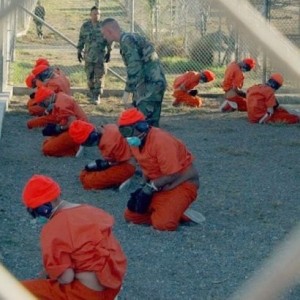Witness Against Torture Group Meets Uighurs
 Three Christian activists from Witness Against Torture traveled to Bermuda on July 16, 2010 to meet with four Uighur men who were detained in Guantánamo Bay, Cuba for more than seven years, and resettled in Bermuda in 2009.
Three Christian activists from Witness Against Torture traveled to Bermuda on July 16, 2010 to meet with four Uighur men who were detained in Guantánamo Bay, Cuba for more than seven years, and resettled in Bermuda in 2009.
The Bush administration conceded that the men are not “enemy combatants,” and in October 2008 a federal judge ordered their release.
The group says the purpose of the delegation to Bermuda was to build relationships with the Uyghurs, seek their counsel concerning further advocacy for both current and former Guantánamo prisoners, and to bring a message of atonement and reconciliation from the American people to the former prisoners.
“In the United States, public discourse on Guantánamo is mainly informed by various perspectives from the military, politicians and the U.S. public,” says John Bambrick, a Chicago youth minister. “We have come to Bermuda to seek the perspectives of men who have experienced Guantánamo firsthand.
“The Uyghur men in Bermuda, like us, are people of faith,” says Jeremy Kirk, a Ph.D. student in social ethics at Union Theological Seminary in New York City. “We are practicing our Christian faith by seeking connection with our Muslim brothers, in whose detention and abuse we have participated as U.S. taxpayers and citizens.”
The three activists visited the Uyghurs’ apartment, shared a meal and swam in the ocean with the former prisoners, and swapped stories about family and religious faith. The Uyghur men shared some of their experiences of being in Guantánamo and discussed their gratitude for and challenges associated with resettlement. The group said the Uighurs are very grateful to the Bermudian Government’s support and hospitality.
The activists also spoke with the Uyghurs in further detail about their experiences at Guantánamo and the conditions currently faced by the men who remain in detention. Luke Hansen, who is studying to become a Jesuit priest, states, “One of the many things that has impressed me in our conversations with these men, whom the Bush administration repeatedly labeled as the ‘worst of the worst,’ is their gentleness and compassion. While these men fiercely criticize the rationalizations behind their detention, they have expressed no resentment towards their captors, but rather have focused solely on the imperative to release the remaining Uyghur detainees at Guantánamo.”
The delegation to Bermuda included: John Bambrick, 31, who works as a Catholic youth minister in Chicago and is a member of the White Rose Catholic Worker; Luke Hansen, S.J., 28, who is part of the Wisconsin Province of the Society of Jesus (Jesuits); and Jeremy Kirk, 32, who is a Ph.D. student in social ethics at Union Theological Seminary in New York City, where he studies interfaith response to crisis and liberation theology.
The four men [Khaleel Mamut, Abdulla Abdulqadir, Salahidin Abdulahat, Ablikim Turahun] were released from the US detention centre at Guantanamo and resettled in Bermuda in July 2009.
The Uighurs landed in Bermuda at around 6am on a private jet, with Bermudians being made aware of their arrival approximately five hours later that day. Controversy erupted after Premier Dr. Ewart Brown’s decision to accept the Uighurs without first consulting Cabinet or Government House.
There were numerous protests locally, and the British Government expressed its displeasure, stating that due to Bermuda’s status as an overseas territory they should have been consulted on the move. Dr. Brown survived a vote of “no confidence” after Parliament rejected the resolution in a 22-11 vote after a marathon 14 hour debate, which went through the night.
Bermuda’s acceptance of the former refugees was applauded by various international human rights groups.

